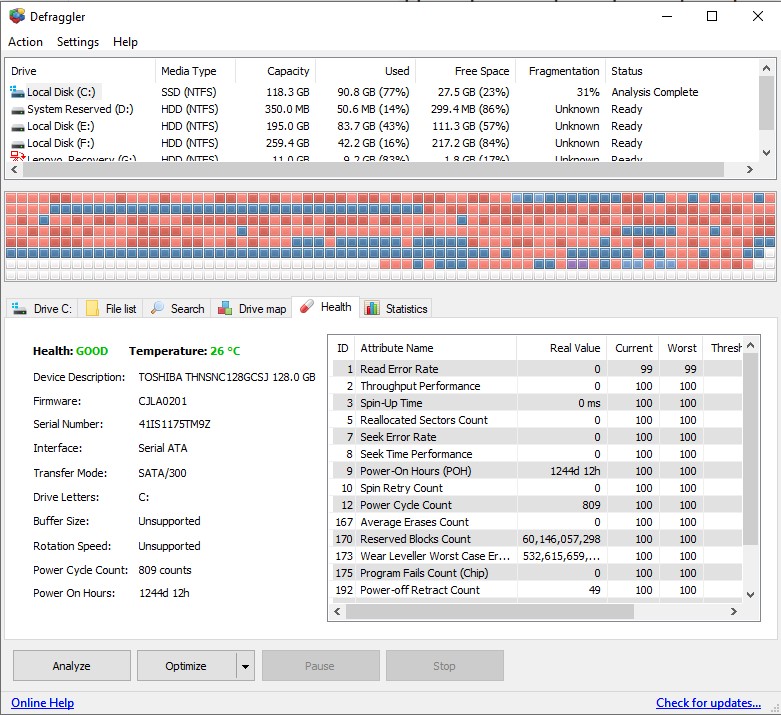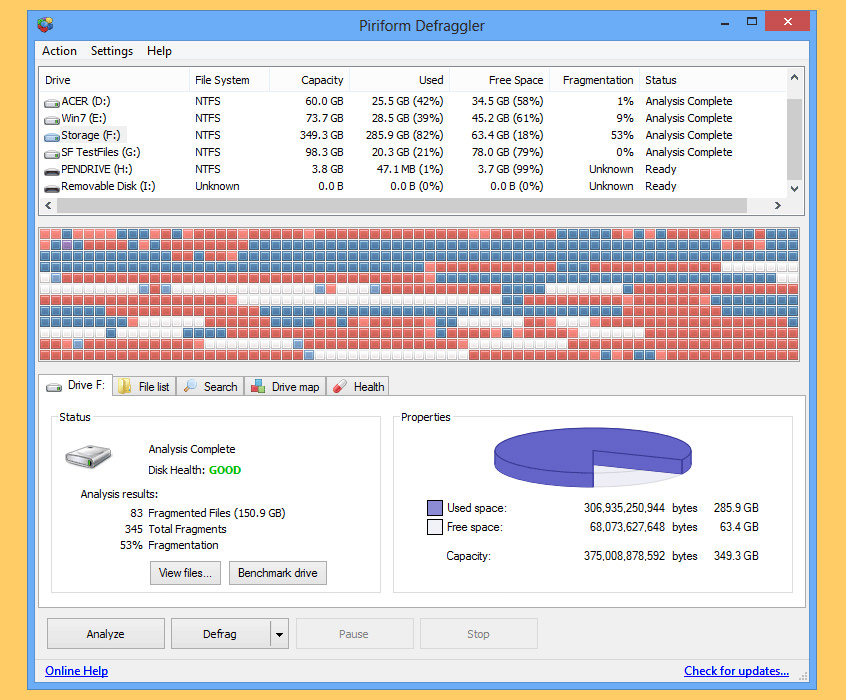

I’m sure you’re aware that drives can fail – catastrophically – without warning, regardless of what you happen to be doing with or to it. The fact that you were facing data loss at all if this drive failed means to me that the data was not backed up – it existed ONLY on the drive in question. Here’s what I see as an even bigger problem. (Though, assuming it’s as simple as it claims to be, and is not malware itself, it’s unlikely it would be a problem.)īut, yes, defragging is a disk-intensive operation, meaning it drives the hard disk heavily. It makes sense that hardware failures or other marginal issues would be more likely to appear when the disk is under the stress of heavy use. Perhaps a hardware issue perhaps the USB interface on the drive perhaps the drive itself – there’s no real way to know.įor all I know, it could even have been due to this “No Sleep” program you’ve mentioned that I’ve never heard of.

What I strongly suspect is that something else caused Defraggler to fail to work for you and ultimately caused the data loss you describe. I have defragged large external disks without incident many times, and there’s nothing about your situation that leads me to believe that it shouldn’t have worked.
Defraggler says disk health warning windows#
If Windows could see it, then Defraggler should’ve been able to see it.įurther, Microsoft’s own defrag should have worked without incident. That Defragler couldn’t see the drive at all leads me to believe there was already a problem with the drive or the USB interface to it. Defragging a drive should never cause data loss, unless there’s a pre-existing underlying problem.īoth Windows’ own defragging tool, as well as the third-party tool Defraggler, should have worked on your external drive. In fact, I suspect that something like that was bound to happen. Unfortunately, there’s really no warning for me to add, other than what I already repeat ad nauseum: if there’s only one copy, it’s not backed up. Your data was already at risk: the drive could have failed at any point and it would all be gone. I’m sorry you had such a time of it, and I’m very relieved you were able to recover your data. I never have used Windows defrag since I was alerted to the existence of third party programs that do a better job of defragging. But you need to add a warning in your instructions to warn people that Windows defrag has problems with large drives … and maybe small ones. I have 8 recovery programs, all third party, which I rarely use. The lack of warning for this on your site led to the loss of my data. My external drive was a terabyte in size. I started by going back on the web and found an article that warned that Windows defrag often hangs up on large drives. The external drive was a backup of sorts, and it was not itself backed up. When I looked at my external drive almost all of the data was gone.

When I awoke the computer was hung up, and I had to back out of defrag. I set defrag to work using another 3rd party program called “No Sleep”, which simulates a person moving the cursor, so the computer doesn’t shut down. The external drive had only 10% of the drive’s size in data, but if I remember right, defrag does not distinguish between data and empty portions of a hard drive. Someone had asked that question, and I followed your instructions to right-click the drive and select defrag from the menu, and Windows defrag would defrag the drive. So, I went looking for a way to defrag my external drive and found your site. Defraggler would not work on the external drive, a USB drive connected to my computer, which is a laptop. I had an external drive, which I decided to defrag. The defragger “Defraggler” worked flawlessly on my computer. I used a third party program that was faster and used less system memory than Windows defragger. Defraggler or Disk Defragmenter?!? I don't know which one is the problem.My computer was getting slow and I had not defragmented the drive in a year, so I set myself to the task. I don't even know which one is accurate now. At my surprise again, it said 2% fragmented! I was shocked again. I went to Windows' built-in Disk Defragmenter to see if their analysis were the same. At my surprise, it went HIGH! From that 10% fragmentation, it increased up to 37% fragmented! I was shocked. This was surprising.Īfter stopping it, I decided to analyze the drive again to see if the fragmentation when low. But then I noticed that the used space increased from 86.3 GB to 103.2 GB! So I stopped the defragmentation.

After that, I clicked the 'Defrag' button to start the defragmentation processes. When I analyzed the drive, it detected 13% fragmentation. The defragmenter I use is Defraggler by Piriform.
Defraggler says disk health warning full#
I decided to do a full defragmentation of my C: drive for the first time this day.


 0 kommentar(er)
0 kommentar(er)
